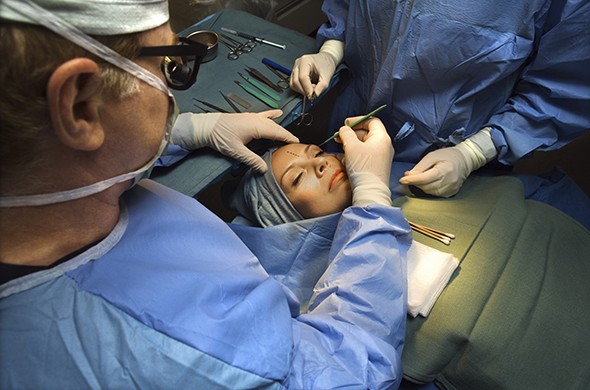
Concerning Anesthesia
Question:
Dear Dr. McCollough: I am a 56 year old female physician. I believe I need a neck lift and possibly a cheek lift. However, I am concerned about anesthesia; I prefer NOT to have a tube in my throat. What type of sedation do you use?
Realizing that most patients are apprehensive about surgery, we have developed an approach to anesthesia designed to make our patients as comfortable as possible before, during, and after their operation.
When patients are apprehensive, we sometimes prescribe medications to take the night before surgery and upon arising on the morning of surgery. By the time the patient arrives at the Clinic (or the hospital) much of their anxiety is greatly reduced. Shortly after arrival, however, additional medications are given so that before going to the operating room the patient is more relaxed and sleepy.
When in the operating room, intravenous medications are given to finalize the “twilight sleep.” After the patient has reached this state of sedation, local anesthetics (usually Xylocaine®) are given to produce numbness in the areas to be operated. After the local anesthetic has taken effect, the patient should experience no discomfort during surgery. When using “twilight sedation”, intubation (having a tube in the throat for breathing), is not necessary. In some cases, supplementary medications may be given if necessary. This we pledge to our patients: If you should become more alert than you wish to be…or feel any discomfort, we will make you comfortable.
“Twilight Sleep” is very similar to that state which exists during the night when the patient is in the deepest stages of natural sleep. If someone nudges him and asks him to “roll-over” he follows the instructions and appears to wake up. The following morning however he can barely recall the incident. This is what we attempt to simulate.
Although most people have amnesia to the operation, they are usually alert upon returning to their room. Our experience with this technique has been that patients are up and around sooner and, we feel, the likelihood of potential complications is reduced.
For certain procedures, however, it is best to have general anesthesia at the hospital. In recent years, general anesthesia has become much safer and simpler for all types of outpatient surgery. New medications which are short-acting and have fewer side effects have made recovery from general anesthesia much more comfortable for patients. Once procedures are completed, patients tend to “wake up” more rapidly and regain awareness of their surroundings.
No matter what type of anesthetic is chosen, you can be certain that every precaution will be taken to make certain your experience is as safe and comfortable as possible.

